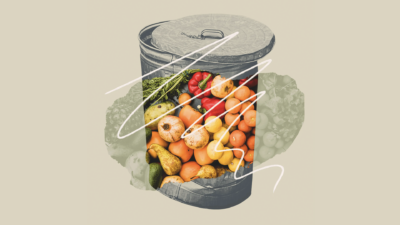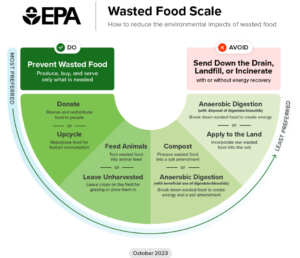Ask the SM: Food Waste on Campus

Ask the Sustainability Manager:
How does CDS handle food waste on campus?
CDS utilizes the EPA’s Wasted Food Scale as a framework for minimization and diversion of food waste from the landfill. Previously known as the Food Recovery Hierarchy, the Wasted Food Scale prioritizes actions that prevent and divert wasted food from disposal. Here at CDS, we utilize all of the preferred strategies that apply to us!

Prevent Wasted Food:
- The Pick Your Portion campaign aims to reduce food waste by allowing students to customize their plate and request the portion size that best fits their needs, whether it’s a half, standard, or double portion.
Donate:
- Partner with the Food Recovery Network to donate surplus prepared food from several dining locations to the Inter-Faith Council each week.
Upcycle:
- When high quality ingredients are left over at the end of a meal period, our culinary team works to incorporate them into the next day’s menu to reduce waste.
- Our Executive Chef Michael Guiess won a Menu Master award in 2022 for his Low Waste Bowl recipe that features ingredients that would otherwise be composted!
Feed Animals:
- Each week, we donate produce scraps from Top of Lenoir’s salad bar to Jenna & Friends Animal Sanctuary to be used as animal feed.
Compost:
- Pre-consumer composting in both dining halls, Bojangles, and the Beach Café.
- Post-consumer composting in both dining halls, Lenoir Mainstreet, and the Student Union. We compost all food returned on the dish belts in Chase and Top of Lenoir!
Anaerobic Digestion (with beneficial use of digestate biosolids):
- Fryer oil is filtered at both dining locations for extended life and then recycled into biodiesel through our partnership with FiltaFry. We’ve recycled over 15,000 gallons of oil this year, reducing our greenhouse gas emissions by about 55,000 pounds.